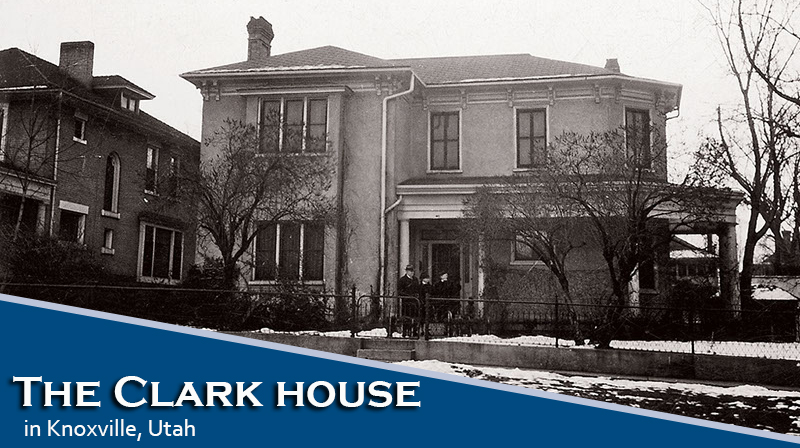
J. Reuben Clark’s “working life” started in 1898 after his marriage to Luacine and ended with his death while serving as 1st Counselor to David O. McKay in 1961. In that 63-year period, he taught school, practiced law, served in many political offices, was on the boards of many large and influential companies, and was a counselor to three Presidents of The Church of Jesus Christ of Latter-day Saints. He authored several influential government papers and gave many talks to Church groups and the Church at large.
After teaching both in Heber and Salt Lake, Clark decided he needed to further his education and in 1903, he was accepted to Columbia Law School from which he graduated in 1906 and was immediately called into public service. His intention at law school was to prepare for a practice as a mining lawyer in Utah, but his government service changed that. In 1913, after resigning as solicitor, he opened a practice in Washington which, because of his connections, dealt mostly with international issues. However, he always had time for more mundane, local issues as well. His international clients ranged from the Japanese Embassy to Nicaraguan government officials. He was permanently retained by the Cuban legation. In 1916, Clark opened a New York office in partnership with Willard Straight. His main client in that office was the American International Corporation which afforded Clark a potentially lucrative business. Although the New York venture was ultimately a casualty of the economic collapse of 1920–21, it had given Clark further exposure to some of the giants of the American economy.
Preston Richards, who had worked with Clark in the Solicitor’s office and was also from Utah, had started a practice in their joint names in Salt Lake in 1913. And it was to this practice that Clark returned after the failure of the New York venture. He practiced law there until his call to the Mixed Claims commission in 1926.
While serving as a Counselor to three Presidents of the Church, Clark also served on several boards, including the New York-based Equitable Life Assurance Society of the United States.
Authorship
J. Reuben Clark wrote several influential government papers (see entries on Clark Memorandum and Ambassador to Mexico). He also gave many eloquent talks to individual Church groups and to the Church at large at general conference. In January 1948, Clark began a series of Sunday-evening lectures on KSL radio titled “On the Way to Immortality and Eternal Life.” These lectures were later published in the first of his Clark’s religious writings. An excerpt from his October 1947 conference address will serve to demonstrate his poetic style as he talked about the LDS pioneers:
So through the dust and dirt, dirt and dust, during the long hours, the longer days—that grew into weeks and then into months, they crept along till, passing down through its portals, the valley welcomed them to rest and home. The cattle dropped to their sides, wearied almost to death; nor moved they without goading, for they too sensed they had come to the journey’s end. That evening was the last of the great trek, the mightiest trek that history records since Israel’s flight from Egypt, and as the sun sank below the mountain peaks of the west and the eastern crags were bathed in an amethyst glow that was a living light, while the western mountainsides were clothed in shadows of the rich blue of the deep sea, they of the last wagon, and of the wagon before them, and of the one before that, and so to the very front wagon of the train, these all sank to their knees in the joy of their souls, thanking God that at last they were in Zion.[ref]http://www.living-prophet.info/LDS/057_J_Reuben_Clark.html.[/ref]
Below is a brief bibliography of J. Reuben Clark’s works with links to the online catalog.
- Clark, J. Reuben (1930). Memorandum on the Monroe doctrine. US GPO. ASINB0006D9U6Q. OCLC1739572.
- (1947). “Gratitude for our heritage”: Address before the Salt Lake Rotary Club. Rotary Club. ASINB0007HE99Y. OCLC28325923.
- (1947). Wist Ye Not That I Must Be About My Father’s Business. Reprint, Relief Society Magazine. OCLC7810610.
- (1949). On the way to immortality and eternal life: A series of radio talks. Deseret Book Company. ASINB0007EJWAS. OCLC3051171.
- (1954). Our Bible: Address at General Conference, The Tabernacle, Salt Lake City, Utah, April 4, 1954. Bookcraft. ASINB0007H2ZL8. OCLC22012699.
- (1968). Immortality and eternal life. Course of study for the Melchizedek Priesthood quorums. LDSChurch. ASINB0007G3A2C. OCLC3405390.
- (1974) [1954]. Our Lord of the Gospels: a harmony of the Gospels. Deseret Book Company. ASINB00183Z8S2. OCLC16790161. The result of his decades-long study of the New Testament.
- (1978) [1962]. Stand fast by our Constitution. Deseret Book Company. ASINB0006WZ8SG. OCLC4558825.
- (1979). Why the King James version. Classics in Mormon literature. Deseret Book Company. ISBN9780877477730. OCLC5008280.
- (1987). Yarn, David H., Jr.. ed. J. Reuben Clark: Selected Papers on Americanism and National Affairs. Deseret Book Company. ISBN9780875791098. OCLC16004232.
- (1991). Behold the Lamb of God. Classics in Mormon literature. Deseret Book Company. ISBN9780875795362. OCLC23769367.
- (1998). To Them of the Last Wagon; and, Who Was This Jesus. Classic Talks Series. Deseret Book Company. ISBN9780875799759. OCLC40197720.
